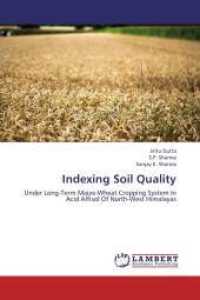- ホーム
- > 洋書
- > 英文書
- > Business / Economics
Full Description
Using a community-based participatory research approach, Shariq A. Siddiqui, Abdul Samad, and Rafeel Wasif investigate the challenges and opportunities in collaborations between nonprofit organizations. With a focus on diverse minority communities, particularly under-resourced, racialized and stigmatized nonprofits and Muslim-led organizations, this book provides different approaches to connect them with the broader philanthropic community.
Taking the Community Collaboration Initiative as a framework to achieve collective impact, the book examines the processes, circumstances, actors and resources necessary to implement and sustain long-term community co-operations. Chapters outline collaboration as a tool that nonprofit organizations can use to scale impact, improve financial stability, strengthen and diversify voices and leadership, and improve credibility and legitimacy. Ultimately, the book sets out a compelling case for the use of intrafaith collaborations across diverse communities to achieve their common missions, goals, and objectives.
This forward-thinking book will be invaluable for students and scholars of philanthropy, social entrepreneurship, organization studies, and development. Its practical focus will also be of use to philanthropists, communities, and practitioners in nonprofit organizations seeking new and innovative ways of solving the problems they face.
Contents
Contents
Foreword
Dilnaz Waraich, President, WF Fund
1 Introduction
2 Nonprofit collaborations and the Community
Collaboration Initiative
3 Muslim philanthropic and nonprofit collaborations in the
United States
4 Building trust in a community collaboration in a virtual
environment
5 Group dynamics and conflict within community collaborations 80
6 Building systems to facilitate collaboration: best practices
and lessons learned
7 Philanthropic interventions and collaborations
Conclusion
Appendices








